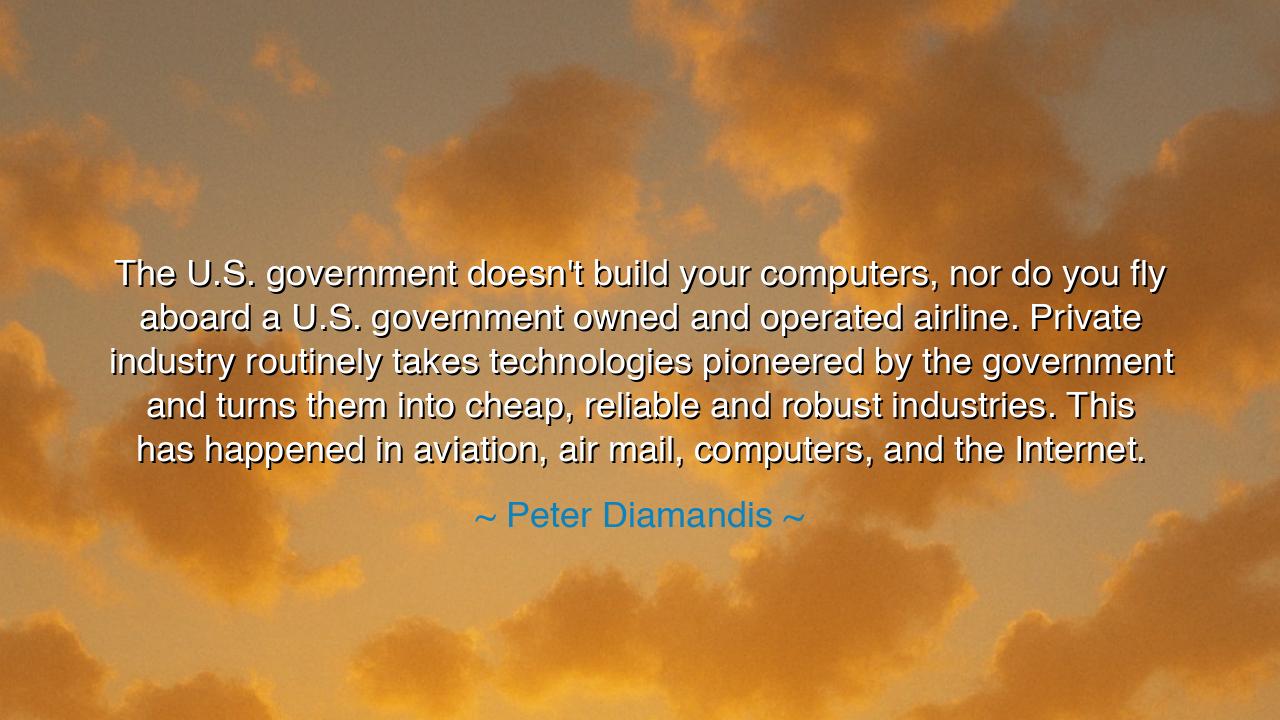
The U.S. government doesn't build your computers, nor do you fly
The U.S. government doesn't build your computers, nor do you fly aboard a U.S. government owned and operated airline. Private industry routinely takes technologies pioneered by the government and turns them into cheap, reliable and robust industries. This has happened in aviation, air mail, computers, and the Internet.






In the grand saga of human progress, there is a powerful truth that resonates through the words of Peter Diamandis: “The U.S. government doesn’t build your computers, nor do you fly aboard a U.S. government owned and operated airline. Private industry routinely takes technologies pioneered by the government and turns them into cheap, reliable and robust industries. This has happened in aviation, air mail, computers, and the Internet.” Diamandis’ words speak to the profound relationship between the public and private sectors in the ongoing quest for innovation. They reveal a deep truth about how government-funded research and technology often serve as the catalysts for the private sector to build upon, refine, and bring to the masses, making these once-impractical innovations into something universal and transformative.
In the ancient world, the seeds of innovation were often planted by statesmen, philosophers, or military leaders who understood that progress could be nurtured through public investment in knowledge and infrastructure. Alexander the Great, for instance, funded vast conquests that not only expanded the empire but also introduced new ideas and technologies to the world. His empire helped bridge the cultures of East and West, spreading ideas and innovations that would later be refined by philosophers like Aristotle. Though Alexander did not live to see the results of his own policies in the same way, the foundation he set in motion led to great advancements that would thrive under the guidance of others. The public investment created the environment for private innovation to flourish.
Consider, too, the Roman Empire, which pioneered engineering feats like roads, aqueducts, and public infrastructure. These public works—though monumental in their scope—were simply tools, not ends unto themselves. It was the private entrepreneurs and engineers, like Vitruvius, who took these technologies and refined them, creating the lasting impact we still feel today. The government provided the framework, but it was private enterprise that ensured these innovations became accessible and useful to everyday people. The ancient world, much like the modern one, teaches us that the true power of any innovation is realized not in its initial form, but in its ability to be shaped, adapted, and distributed by those who can make it practical for the masses.
Fast forward to the modern world, and Diamandis’ reflection on technology mirrors a reality that has played out time and time again. The Internet, for example, was initially developed by the U.S. government through the ARPANET project, primarily for military and academic use. It was a tool for researchers and scientists, and it was not designed to be the global network that we now use daily. However, it was private industry—companies like AOL, Netscape, and later Google—that took this government-funded technology and turned it into the ubiquitous tool we now rely on. The public sector laid the foundation, but it was the private sector that recognized the potential, shaped it, and made it accessible to everyone.
This pattern is seen again in aviation. The Wright brothers, with their humble beginnings in bicycle repair, received no government subsidy or funding for their groundbreaking work in flight. However, they were the product of a time in which governments began to understand the military and strategic importance of flight. Government contracts funded the expansion of aviation during the early 20th century, but it was the private sector—think Charles Lindbergh, Howard Hughes, and the great airline companies—that took the technology of flight and turned it into the modern aviation industry we now take for granted.
Diamandis’ words carry a powerful lesson: the public sector often provides the initial spark of innovation, but it is the private sector that has the agility, drive, and creativity to turn those ideas into something transformative. The partnership between the two is what drives progress forward. This dual contribution is essential in advancing societies—governments provide the vision, the infrastructure, and the resources, while private companies bring these ideas to life, making them accessible and scalable to the world.
In our own lives, the lesson to take from Diamandis’ words is that true progress comes not from relying on any one source of innovation, but from fostering collaboration between the public and private spheres. We must understand that ideas alone are not enough; it is the ability to take those ideas, refine them, and implement them on a grand scale that leads to meaningful change. As we navigate the complex world of technology, business, and innovation, let us remember that creativity and vision come from both sectors, and that partnership between them is key to creating a future where knowledge and progress benefit all.
So, the practical action is clear: whether we are policymakers, innovators, or simply individuals seeking to make a difference, we must encourage an environment where public investments in science and technology are paired with the entrepreneurial spirit of the private sector. By doing so, we foster a future where ideas are not confined to laboratories or government contracts but are brought to life in the real world, transforming society and shaping a better, more connected future for all. The history of human progress has been a testament to this collaboration, and our own future depends on it.






AAdministratorAdministrator
Welcome, honored guests. Please leave a comment, we will respond soon